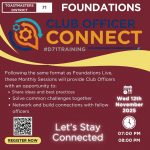Foundations Online Videos: Club Treasurer
Responsibilities
Hello everybody, my name is Chris and I’ll be guiding you throughout this short video series about the role as treasurer in Toastmasters clubs So let’s get straight on into it. What is a treasurer? What are the responsibilities? Essentially as the treasurer you are the club’s accountant so you’re responsible for managing the budget and the bank account Collecting membership dues and processing membership renewals to Toastmasters International.
Let’s have a look at what the club constitution states. The treasurer is responsible for club financial policies procedures and controls. The club treasurer receives and disperses with the approval of this club all club funds, pays to Toastmasters International all financial obligations of this club as they come due and keeps an accurate account of all transactions. The club treasurer shall make financial reports to the club and to the club executive committee quarterly and upon request, and shall transmit the accounts and all undistributed funds to the successor in office at the end of the club treasurer’s term.
So that’s quite lengthy.
But what does it all mean? Simply put the specific responsibilities of a club treasurer are to manage the budget and the accounts collect membership dues and ensure prompt payment to Toastmasters International, make approved payments on behalf of the club and provide reports to the club executive committee at least quarterly and to the whole club at least annually. Provide the details of all transactions and copies of receipts to the club’s audit committee. Now these responsibilities should be fulfilled through the Toastmasters core values of integrity respect, service and excellence And tailored to your own leadership style
In the next video we’ll be looking at what your responsibilities are within the first two weeks or a month of the role.
Getting started in the role
One of the first things that you need to do is get access to the accounts. The most important one of course is the club bank account. How do you know what’s been going on or how much money is even in the bank if you don’t have access to it. So you want to make sure that you add yourself as the mandate or signatory to the club’s bank account. And you need to work with the past Treasurer to make sure that this happens.
It can take a while for this to take place. You need to sometimes go into the branch itself and sign documents and hand over passport information or ID and proof of address. That’s why you need to make sure that it is a priority to get this meeting set up and get yourself added to the club. There are also other things that you need access to such as the club email accounts. Other payment providers that your club may use such as go cardless stripe or Revolut. There is also the handover period with the previous treasurer and it’s important to understand What’s happened in the past year and to get an overview of the current budget. It’s good to have a look at what’s worked well and what hasn’t and if there’s any areas of improvement that you can make in your role. It’s also a good idea to get a list of regular bills that you need to be that need to be paid along with the contact details. So for example the venue hire or the website any printing providers that you may use. The next step is to plan a budget for the year, so it’s important to spend some time with the previous treasurer to familiarize yourself with how the budget spreadsheet works and the calculations that are required.
In the next video we’ll be diving deeper into the budgets: what a budget is, how to create a budget and how this is important for the success in your role as the club’s treasurer.
The budget
In this next section, we’ll be looking at the budget. This is probably the most important part of your role.
A budget is a financial plan that estimates a club’s income and expenses over a specific period. At Toastmasters, that period is typically the year from July to June. A Toastmasters budget helps the club manage its money wisely and ensures resources are used effectively to meet the club’s goals.
Why is a budget important?
-
It ensures the club runs smoothly, responsibly, and sustainably.
-
It supports financial planning and stability. A budget outlines expected income and expenses, helping the club plan effectively and avoid running out of money unexpectedly.
-
It supports the club’s goals and activities.
-
It provides transparency and accountability.
-
It aids decision-making—e.g. can we afford new banners, or refreshments for guests?
-
It prepares the club for unexpected costs such as venue changes or technology needs.
Creating and managing a budget is a crucial part of the role. Your club may already have a budget process in place; contact your past treasurer during the handover period to check. If a budget exists, that’s excellent. If not, a template is provided at the end of the module.
Screen-share demonstration
The template contains three tabs: Budget, Actual, and Monthly Report.
-
Budget tab
-
Income section: list all expected income sources. Predict monthly amounts—for example, forecast fundraiser income in November or anticipated donations and membership dues.
-
Expenses section: enter expected costs. Formulas total each column automatically.
-
Net income is calculated as total income minus total expenses.
-
Budget cash flow: enter predicted opening cash balance, net income, and closing cash balance.
-
-
Actual tab
Record real income and expenses at the end of each month. This mirrors the Budget tab but reflects what actually happened. -
Monthly Report tab
Complete this in the first week of each month, looking back at the previous month. Share it with the club committee to spot any red flags. Copy figures from the Budget and Actual sheets; variance is calculated automatically. For example, if £1,200 was budgeted for membership dues but only £1,080 was received, the variance is £120 adverse. Add explanations for future reference.
This template is excellent, but if your club already has an effective one, continue using it. Otherwise, feel free to adopt this version.
Payments
Paying bills is an important part of your role. Club expenses may include venue hire, supplies, marketing, or technology costs. Pay bills on time and keep receipts, updating your budget regularly.
Membership renewal payments
These occur twice a year and are paid to Toastmasters International on 31 March and 30 September. Mark these dates in your calendar and start asking members early if they wish to renew.
Corporate or organisational clubs
If the club lacks its own bank account, liaise with the relevant company contact who can make payments. Start this process early, as it can take time.
New-member fees
These are also paid to Toastmasters International. Some clubs allow members to self-pay online, simplifying the treasurer’s work. Others require the treasurer to handle payments. Check with the previous treasurer to understand current practice. If the existing process no longer serves the club, discuss alternatives with the committee before making changes.
Club Leadership
As a member of the club’s executive committee, you will need to provide regular reports on the status of the club’s finances. This should include the club’s bank balance, income, and expenditures. Offer advice on how club funds can be used effectively to achieve the club’s mission. For example, perhaps membership renewal is low or there are no new guests attending.
You could advise the Vice President Public Relations that some budget could be allocated to marketing in order to improve this. There are different ways you can contribute by suggesting ideas to other members of the committee.
You can also provide expertise on relevant Toastmasters International policies and protocols—particularly Protocol 8.0. You can click on the link below this video to learn more about that.
The Club Audit Committee
The Audit Committee is appointed by the Club President and is responsible for ensuring that the club’s finances and assets are managed in line with the club constitution and the wishes of its members.
It is your responsibility to provide the Audit Committee with copies of bank statements, receipts, and any other supporting material regarding the club’s income and expenditure.
You also have an opportunity to educate members of the Audit Committee on Toastmasters standards. Audit Committee members can make good successors for the Treasurer role, so keep an eye out for members who may be suitable when the year comes to an end.
Related Resources
News
Upcoming Events
-
19 Oct19 Oct 25 -
19 Oct -
-
-
21 Oct21 Oct 25 -
23 Oct23 Oct 25 -
-
-
10 Dec10 Dec 25 -
14 Jan14 Jan 26 - all events



